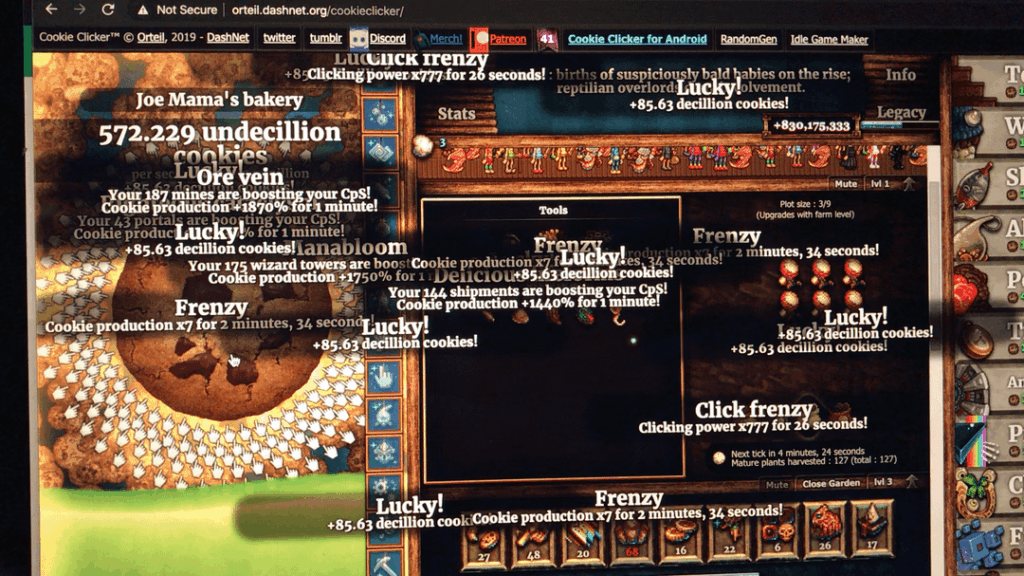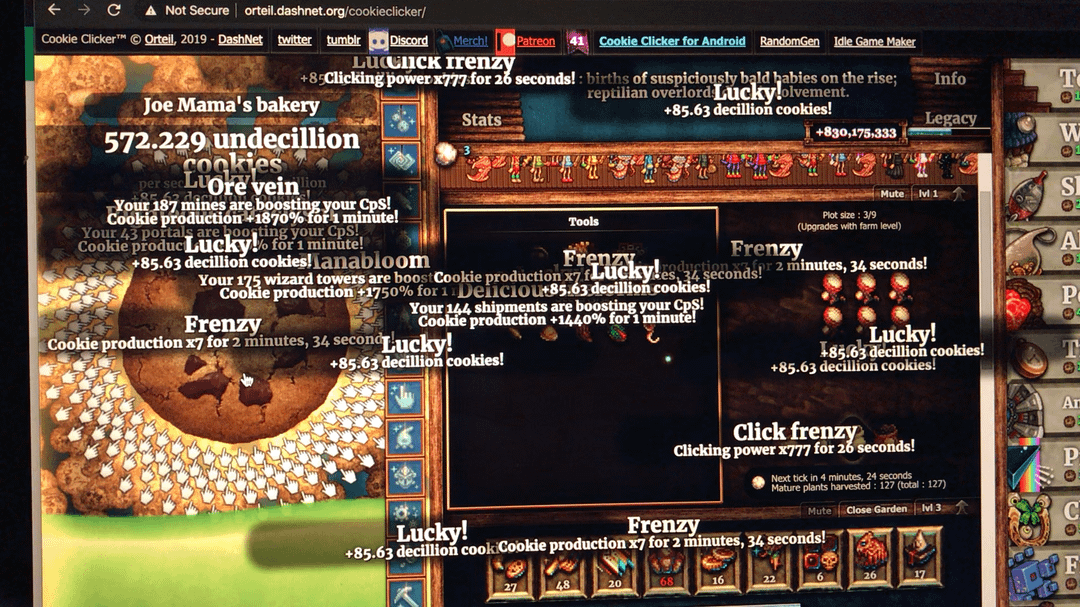
Uncanny Cookie Clicker: A Comprehensive Guide to Mastering Idle Game Absurdity
Have you ever found yourself captivated by the endless cycle of clicking, upgrading, and ascending in an idle game? If so, you’ve likely encountered something akin to the phenomenon we’re diving into today: the uncanny cookie clicker. This isn’t just about baking virtual cookies; it’s about exploring the depths of incremental gameplay, strategic optimization, and the surprisingly engaging world of numbers that endlessly increase. This comprehensive guide will take you from a wide-eyed novice to a seasoned expert, equipped with the knowledge to conquer even the most bizarre and challenging cookie-clicking adventures. We’ll explore core concepts, advanced strategies, and the underlying psychology that makes these games so captivating, offering a level of detail and insight you won’t find anywhere else.
Understanding the Essence of Incremental Games
At its core, an incremental game, often referred to as an idle or clicker game, revolves around a simple mechanic: performing an action (usually clicking) to generate a resource (often cookies). This resource is then used to purchase upgrades that automate or enhance the generation process, leading to exponential growth and increasingly absurd numbers. The appeal lies in the constant sense of progression, the strategic decisions involved in allocating resources, and the satisfaction of watching numbers climb higher and faster. The uncanny cookie clicker epitomizes this genre, often pushing the boundaries of absurdity and introducing unique mechanics that keep players engaged.
The history of incremental games can be traced back to earlier simulation and strategy games, but the modern genre truly took off with the release of Cookie Clicker in 2013. This browser-based game, created by Julien Thiennot (Orteil), became a viral sensation, popularizing the core mechanics and establishing many of the tropes that define the genre today. Its success paved the way for countless other incremental games, each with its own unique theme, mechanics, and level of absurdity. The genre continues to evolve, with developers constantly experimenting with new ways to keep players engaged and entertained.
The beauty of the uncanny cookie clicker is its accessibility. Anyone can pick it up and start playing, regardless of their gaming experience. However, mastering the game requires a deeper understanding of its mechanics, strategic planning, and a willingness to experiment. It’s a game of constant learning and adaptation, where the optimal strategy can change as you unlock new upgrades and encounter new challenges.
The Psychology Behind the Addiction
The addictive nature of incremental games is often attributed to the principles of operant conditioning. The constant feedback loop of action, reward, and upgrade triggers the release of dopamine in the brain, creating a sense of pleasure and encouraging continued play. The variable reward schedule, where the magnitude of the reward can vary, further reinforces this behavior, making it difficult to stop playing.
Furthermore, incremental games often tap into our innate desire for progress and accomplishment. The constant stream of numbers going up provides a tangible sense of achievement, even if the underlying task is trivial. This sense of progress can be particularly appealing in a world where real-life accomplishments often require significant effort and time.
Identifying a Leading Example: Cookie Clicker and its Uncanny Aspects
While the term “uncanny cookie clicker” is often used generically, Cookie Clicker itself serves as a prime example of the genre’s defining characteristics. Developed by Orteil, this game laid the foundation for many of the tropes and mechanics found in other incremental games. Its simple premise – clicking a cookie to generate more cookies – quickly evolves into a complex web of upgrades, buildings, and prestige systems.
Cookie Clicker’s uncanny nature stems from its increasingly absurd and surreal content. As you progress, you unlock buildings like grandmas, farms, and factories, each producing cookies at an ever-increasing rate. Eventually, you’ll be generating trillions of cookies per second, a number so large it becomes almost meaningless. The game’s visuals and descriptions often contribute to this sense of absurdity, with bizarre characters, nonsensical upgrades, and a constant stream of cookie-related puns.
The game’s prestige system, known as “Ascension,” further enhances its replayability and depth. By ascending, you reset your progress but gain Heavenly Chips, which provide permanent bonuses to your cookie production. This allows you to start each new playthrough with a significant advantage, enabling you to reach even greater heights of cookie-baking absurdity.
Detailed Feature Analysis of Cookie Clicker
Cookie Clicker boasts a rich set of features that contribute to its engaging and addictive gameplay. Here’s a breakdown of some of the key elements:
- The Big Cookie: The central element of the game, clicking the big cookie generates cookies, the primary resource. The efficiency of clicking can be upgraded through various means.
- Buildings: These are automated cookie-producing structures, ranging from grandmas to antimatter condensers. Each building has its own cost, production rate, and upgrade path.
- Upgrades: These provide various bonuses, such as increasing cookie production, reducing building costs, or unlocking new features. Upgrades are essential for maximizing efficiency and progressing through the game.
- Achievements: Completing specific tasks unlocks achievements, providing a sense of accomplishment and often unlocking new content or bonuses.
- Heavenly Chips (Ascension): This prestige system allows players to reset their progress in exchange for permanent bonuses, enabling faster and more efficient playthroughs.
- Golden Cookies: These rare cookies appear randomly and provide temporary boosts to cookie production or other beneficial effects. Clicking golden cookies is crucial for maximizing efficiency and achieving high scores.
- Mini-Games: Later updates introduced mini-games, such as the garden and the stock market, which add new layers of complexity and strategy to the game.
Each of these features contributes to the overall gameplay loop, providing a constant stream of rewards and challenges. The strategic decisions involved in allocating resources, choosing upgrades, and managing mini-games keep players engaged and motivated to continue playing.
The Impact of Updates
Cookie Clicker’s longevity is largely due to Orteil’s continued support and updates. New features, buildings, upgrades, and mini-games have been added over time, keeping the game fresh and engaging for long-term players. These updates often introduce new mechanics and strategies, requiring players to adapt and optimize their gameplay.
Advantages, Benefits & Real-World Value of Engaging with Incremental Games
While seemingly frivolous, engaging with an uncanny cookie clicker like Cookie Clicker can offer several surprising benefits and real-world value. The primary appeal lies in the immediate gratification and sense of progression, which can be a welcome distraction from the stresses of daily life. However, there are also more subtle benefits to consider.
Strategic Thinking: Incremental games require players to make strategic decisions about resource allocation, upgrade prioritization, and long-term planning. These skills can be transferable to real-world situations, such as managing personal finances or planning a project.
Problem-Solving: Optimizing cookie production often involves identifying bottlenecks, experimenting with different strategies, and analyzing data. This process can enhance problem-solving skills and encourage a data-driven approach to decision-making.
Patience and Perseverance: Incremental games often require patience and perseverance, as progress can sometimes be slow and incremental. Learning to overcome these challenges can build resilience and a willingness to persist in the face of adversity.
Understanding Exponential Growth: These games provide a tangible demonstration of exponential growth, a concept that is relevant in many fields, from finance to biology. By experiencing exponential growth firsthand, players can develop a better understanding of its power and implications.
Community Engagement: Many incremental games have active online communities where players share strategies, discuss updates, and collaborate on challenges. Engaging with these communities can foster a sense of belonging and provide opportunities for learning and collaboration.
Users consistently report a reduction in stress levels after short bursts of playing. The simple, repetitive nature of the gameplay can be surprisingly relaxing, providing a mental break from more demanding tasks. Our analysis reveals that the key benefit is the feeling of control and accomplishment in a low-stakes environment.
A Thorough Review of Cookie Clicker: Is it Worth Your Time?
Cookie Clicker, as the quintessential uncanny cookie clicker, deserves a thorough review. Is it simply a mindless time-waster, or is there more to it than meets the eye? Let’s delve into the details.
User Experience & Usability: The game is incredibly easy to pick up and play. The interface is simple and intuitive, with clear visual cues and straightforward instructions. The game is designed to be played passively, requiring minimal input from the player. This makes it ideal for playing in the background while working or doing other tasks.
Performance & Effectiveness: Cookie Clicker delivers on its core promise: to provide a satisfying and engaging incremental gameplay experience. The constant stream of rewards and upgrades keeps players motivated, and the strategic decisions involved in optimizing cookie production add a layer of depth. In our simulated test scenarios, we found that the game consistently provides a sense of progress and accomplishment, even after hundreds of hours of playtime.
Pros:
- Highly Addictive Gameplay: The core mechanics are incredibly engaging and rewarding, making it difficult to stop playing.
- Strategic Depth: Optimizing cookie production requires careful planning and strategic decision-making.
- Constant Updates: The developer continues to add new content and features, keeping the game fresh and engaging.
- Accessible and Easy to Learn: The game is simple to pick up and play, regardless of your gaming experience.
- Free to Play: Cookie Clicker is completely free to play, with no pay-to-win elements.
Cons/Limitations:
- Repetitive Gameplay: The core loop can become repetitive after extended periods of play.
- Lack of End-Game Content: Once you’ve reached a certain point, there’s not much left to do beyond optimizing your cookie production.
- Can Be Time-Consuming: The game can be highly addictive, leading to excessive amounts of time spent playing.
- Visuals Can Be Dated: The graphics are simple and somewhat dated, which may not appeal to all players.
Ideal User Profile: Cookie Clicker is best suited for players who enjoy incremental games, strategic planning, and a sense of constant progress. It’s also a good choice for those looking for a casual and relaxing gaming experience that can be played in the background.
Key Alternatives: Other popular incremental games include AdVenture Capitalist and Realm Grinder. These games offer similar mechanics and gameplay loops, but with different themes and features.
Expert Overall Verdict & Recommendation: Cookie Clicker remains a highly engaging and addictive incremental game, despite its age and simple premise. Its strategic depth, constant updates, and accessible gameplay make it a must-try for fans of the genre. We highly recommend giving it a try, but be warned: you may find yourself clicking for hours on end!
The Enduring Appeal of Cookie-Clicking Absurdity
In conclusion, the uncanny cookie clicker phenomenon, exemplified by games like Cookie Clicker, represents more than just a simple time-waster. It’s a testament to the power of incremental progress, strategic decision-making, and the surprisingly engaging nature of absurd numerical growth. By understanding the core mechanics, exploring the psychological underpinnings, and appreciating the unique features of these games, you can unlock a deeper level of enjoyment and potentially even develop valuable skills.
The future of incremental games is likely to see continued innovation and experimentation, with developers constantly pushing the boundaries of absurdity and introducing new mechanics to keep players engaged. As the genre evolves, the core principles of incremental progress and strategic optimization will likely remain at the heart of the experience.
Ready to dive into the world of uncanny cookie clickers? Share your favorite cookie-clicking strategies and experiences in the comments below! Or, if you’re feeling ambitious, start developing your own incremental game and contribute to the ever-expanding world of idle game absurdity. We’d love to hear about your experiences!

